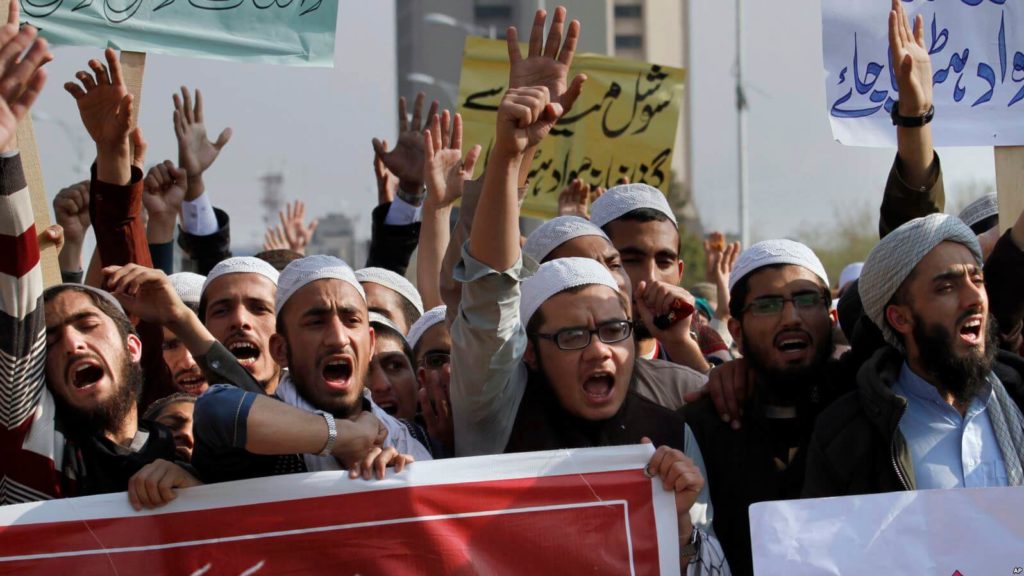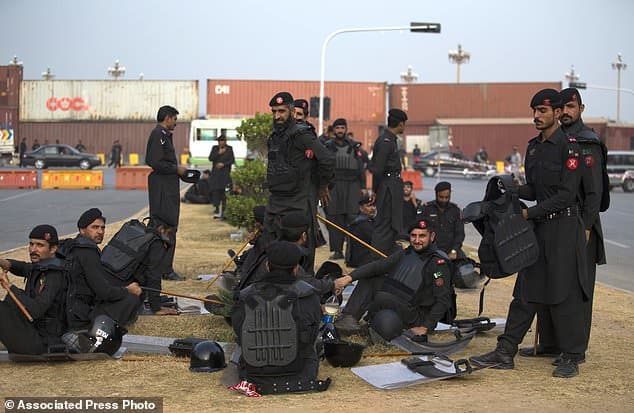Several thousand Islamists in Pakistan have effectively blocked a main crossing near the national capital, Islamabad, crippling the daily life of millions of people and underscoring challenges facing the country’s counter extremism efforts.
The rally began with a few hundred members of the small radical Tehreek-i-Labaik Ya Rasool Allah party who had gathered earlier this week at the main Faizabad crossing outside Islamabad.
By Friday afternoon, the gathering grew to over 3,000, disrupting public life and prompting police to set up shipping containers on the throughway to prevent the protesters from entering the city. The demonstrators sought the removal of Zahid Hamid, although he has apologized and said the omission of the reference how Muhammad is the last prophet in Islam was a clerical mistake that was later corrected by the parliament.
But demonstrators claim Hamid made the omission purposefully to appease the minority Ahmadis sect.
Addressing emotionally charged demonstrators, Khadim Hussain Rizvi, the head of the Tehreek-i-Labaik Ya Rasool Allah party, said they will not end their protest until the government has sacked Hamid.
“We will not allow anyone to change Islamic laws,” he said, as people chanted: “We will die to protect the honor of the Prophet.”
The rally drew criticism from residents and rights activists when an infant died Thursday on the way to a hospital due to the road blockades in Islamabad. Police say they have charged the rally’s organizer, Rizvi, with manslaughter following complaints from the child’s parents who claim his life could have been saved had they reached the hospital in time.
The government has said it wants the protesters to peacefully disperse and authorities are in communication with Rizvi — who has not yet been detained over the charge — to end the sit-in along with the other clerics in attendance.
Pakistani Interior Minister Ahsan Iqbal told media that the government has rejected the protesters’ demand for the law minister to be removed, saying there is no charge against him.
“There is a small group of certain demonstrators who are sitting on one road. We are trying to talk to them through dialogue to persuade them that this is an illegal action to make a sit-down on the road because there is a restriction on such an assembly under the law. However, if they indulge in any violent activity the law will take its course,” Iqbal said.
The rally has also caused inconvenience to commuters as authorities have suspended the only bus service linking the nearby garrison city of Rawalpindi with Islamabad.
Islamabad’s administration has placed scores of shipping containers and deployed up to 4,000 policemen to prevent protesters from entering Islamabad’s key areas, particularly the “Red Zone” housing foreign diplomatic missions, government offices and the parliament.
Authorities have hinted at using force over the weekend if their talks with Rizvi fail.
On Friday evening, authorities started cordoning the rally amid rumors of imminent action against the demonstrators, who have virtually sieged an important entry gateway into the capital.
Pakistan has also stepped up security at places of worship for Ahmadis, as the protesters are accusing Hamid of transgressing to appease the small sect.
Ahmadis are declared non-Muslims under the Pakistani constitution and considered apostates by the clergy. Members of the community in Pakistan are barred from calling themselves Muslims or referring to their worship places as mosques.
Ahmadis’ interpretation of Islam differs from traditional orthodox positions, and community leaders insist their faith has been misinterpreted by mainstream Muslims, encouraging fundamentalists to persecute and preach violence against them.


